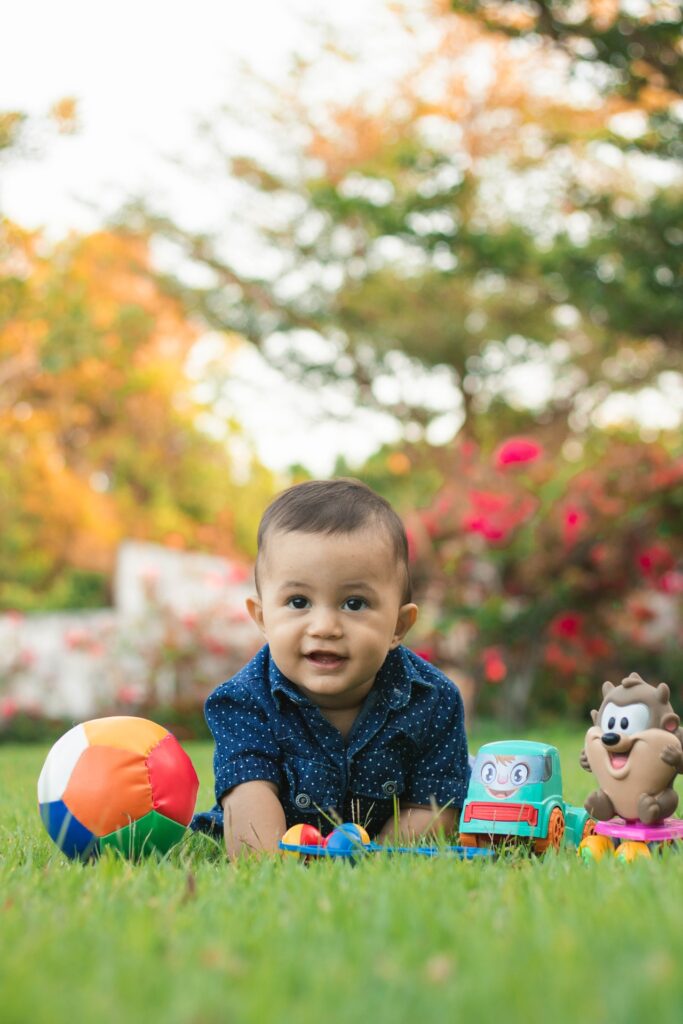Very young toddlers sometimes find it very difficult to share. Their vision of the world still focuses just around them. They find it hard to give up a favourite toy, or one they’ve just picked up a few moments ago.
Toddlers and preschoolers
As very young children do not yet understand the concept that they will have something back in a short while, they can’t forego time with a toy. This doesn’t mean they can never share. It isn’t recommended to force your young child to share, as they don’t yet understand consequences of sharing. At this age, children engage in parallel play, where they play alongside each other. Generally, once children have formed a familiarity with each other, they are willing to share for a short while.
It may take practice to share at this age, try encouraging the sharing of a toy that isn’t too appealing to the toddler, and giving him something more interesting to play with in the meantime. Additionally only expect the toddlers to share for small amounts of time, five minutes or so. If both don’t agree give the toy a rest for 5 minutes till the toddlers anticipate it’s better to share than not have the toy. Toddlers, will share eventually, I wouldn’t advise forcing them. In the meantime they can be introduced to sharing, on occasion where they meet their friends.
In the case of an older and younger sibling, at times the younger sibling may want a toy, but they can be encouraged to share with the older sibling. It isn’t fair for the older, more aware and self regulating child to always have to share their favourite toy.
At a young age, children develop a very strong sense of right and wrong, and of justice. It is a safe place, where fairness and justice are norm.
So the toddler can be encouraged to share and will gradually develop the habit. It is, after all, In their best interests, to be able to cooperate with those around them. In the beginning, the toddler may have a tantrum, but in time she will begin to understand the concept of sharing.
You can encourage the process by setting a time limit, perhaps you can have a buzzer, or otherwise keep a steady eye on the time.
Explain to the toddler that their older sibling wants the toy for some time, and they will surely get it back, in a way that the toddler understands.
Explain to the older child that their younger sibling has strong feelings, and is still learning to share, but will get there soon. That for this reason, at least initially sharing times for joint favourite toys will be short, but swaps will be made frequently and fairly.
‘Your brother is just learning to share, but in a while, you will be able to play and swap toys much more comfortably, right now he is getting used to it and can only share for a small amount of time.’

Attachment
Children often form attachment to things, and this is a normal part of development. A young child may have a favourite teddy or doll, that they take everywhere. It is necessary to recognise the importance of attachment in early child development. Obviously it will be hard to share their favourite toy, but they may want to part from others for a short while.
Some children who have experienced attachment parenting may be more ready to share and have empathy for other children however attachment parenting is not the same as secure attachment, necessarily. Other children, may feel they want their toy. Never force a child to share, this is a gradual process, where eventually, through training, children develop a life long skill.
You may want to encourage a young child to give out her chocolates to everyone in the room, and demonstrate that sharing is an approach that brings joy and is deeply appreciated by the recipient.
You may also want to encourage sharing in fun games, where the child enjoys being generous in a fun filled atmosphere.
Slowly, but surely, the child learns to let go a little.
The best approach is to give plenty of praise for successful sharing, so the child associates sharing as a positive, cooperative action, which makes everyone happy.
School age children
Children of school age have a better understanding of other people’s feelings. It may be that they don’t want to part with a very favourite toy, but that’s alright.
Show your child you are fair and every child is given a turn equally, with the ball, or with a soft toy. Children will develop their sense of justice in this way.
Even at this age though, there may some items the child doesn’t want to let go of, even for a short duration. Allow your child to keep favourite toys for themselves, and share others.

Planning a play date
The best way to teach your child about sharing is to give him plenty of opportunities, call friends over and establish relationships of trust with other children.
You may want to ask your child which toys he would rather not share before a play date and remove those from the selection, prior to the arrival of your child’s friends. In this way your child will feel in control and will know his most prized possessions are in a safe place.
Those favourite toys shouldn’t be taken out of the car, for example, on a trip. This avoids unnecessary confrontations, tantrums and needless stress.
If a favourite toy is out when a guest comes, you be the referee and move it out of the way, so your child has the confidence that her things are protected.
Learning to share is a work in progress, but if taught correctly, can bring many moments of joy fun and cooperation.
